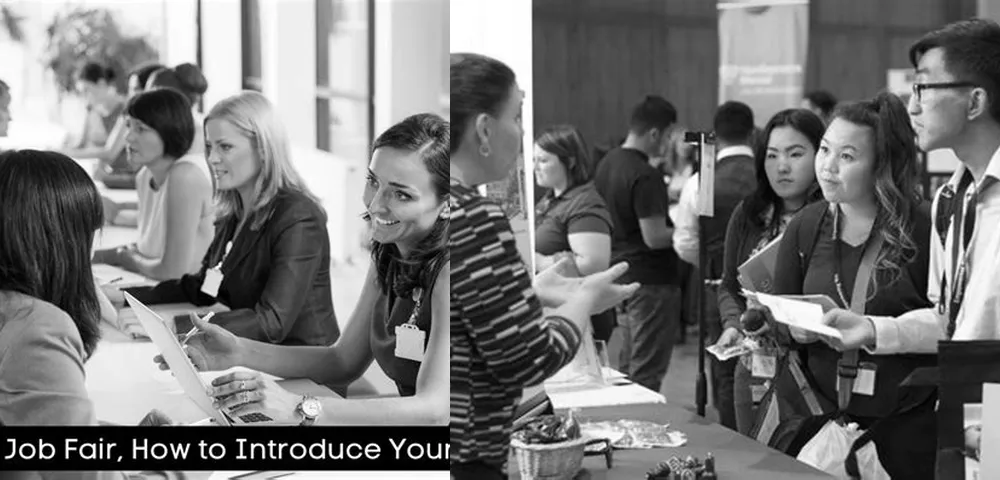How to Make a Memorable First Impression at a Career Fair: Mastering the Art of Introducing Yourself – Mastering the Art of First Impressions at Career Fairs
Are you ready to make a lasting impression at your next career fair? It all starts with a confident and compelling introduction. Whether you’re a seasoned professional or a fresh graduate, knowing how to introduce yourself effectively can be the key to unlocking exciting job opportunities. In this blog post, we’ll explore the strategies and techniques to help you stand out from the crowd and leave a positive impression on recruiters. So, let’s dive in and discover the secrets of introducing yourself in a career fair that will leave a lasting impact!
Mastering the Art of First Impressions at Career Fairs
The career fair is a bustling marketplace of prospects and opportunities. To capitalize on this, knowing how to introduce yourself effectively is paramount. Here, we’ll delve into the nuances of making a memorable first impression.
Step One: The Approach
Initiating contact is the first crucial step. A sincere smile, direct eye contact, and a firm handshake set the stage for a positive interaction. Recruiters are experts at reading body language, and your approach speaks volumes before words are even exchanged.
Step Two: Solo Introduction
While it might be comforting to approach recruiters with friends, flying solo is key. It showcases your initiative and confidence, traits that are highly regarded in any professional setting.
Step Three: Sharing Your Essentials
Begin with the basics – your name, your academic standing, and your major. This establishes a foundation for the recruiter to understand who you are and what you’re studying.
Highlighting Accomplishments and Skills
After the basics, it’s time to shine. Mention an accomplishment or a skill that’s pertinent to your job hunt. Perhaps you’ve led a successful project or mastered a new technology that’s revolutionizing your field; this is your moment to share that.
Relating Internship and Research Experiences
Briefly touch upon an internship or research project that’s relevant to your career aspirations. This not only demonstrates your practical experience but also your active engagement in your field of study.
The Personal Commercial Template
Consider using a personal commercial template to streamline your introduction. This should include your name, your expertise, and a quick overview of your experiences and aspirations.
Engaging with Recruiters on a Deeper Level
Once you’ve mastered the initial introduction, it’s time to engage the recruiter with more depth about your experiences.
Describing Tasks and Situations
Elaborate on specific tasks and situations you’ve handled that showcase your abilities. This could be a challenging project you navigated, a team you led, or an innovative solution you developed.
The Importance of Networking
A career fair is a goldmine for networking. Engage not only with recruiters but also with fellow job seekers and professionals. Every interaction has the potential to open new doors.
Navigating Career Fair Etiquette
The unwritten rules of career fairs are as important as the spoken interactions.
Maintaining Professional Decorum
Always maintain professionalism in your conversation. Speaking negatively about your college or previous jobs can reflect poorly on your character and judgment.
Continuing the Conversation
After your introduction, be prepared to continue the dialogue. Ask knowledgeable questions about the company and express genuine interest in their work.
Polishing Your Introduction Over Time
Practice makes perfect. Refine your introduction regularly and seek feedback from mentors and peers.
Reflecting on Each Interaction
After each conversation, take a moment to reflect on what went well and what could be improved. This will help you polish your introduction for future opportunities.
Adapting to Feedback
Be receptive to feedback and willing to make adjustments. This could mean tweaking your body language, refining your choice of words, or reordering the information you present.
Conclusion: The Lasting Impression
Introducing yourself at a career fair is about more than just reciting facts; it’s about telling a compelling story of your journey, skills, and potential. Remember to smile, be confident, and most importantly, be yourself. The best introduction is one that is authentic and leaves the recruiter eager to learn more about you.
As you navigate the bustling corridors of career fairs, keep these strategies in mind. With a well-crafted introduction, you’re not just saying hello – you’re opening a door to the future.
FAQ & Common Questions about Introducing Yourself in a Career Fair
Q: How do you introduce yourself in a career fair?
A: To introduce yourself in a career fair, initiate contact with recruiters by smiling, making eye contact, and shaking hands. Approach recruiters individually, not with a group of friends.
Q: What should you say when pitching yourself in a career fair?
A: When pitching yourself in a career fair, start with your basic information such as your name, year in school, and major. Follow this with at least one accomplishment or skill relevant to your field.
Q: What are two things you should not do at a career fair?
A: Two things you should not do at a career fair are: 1) Don’t waste the opportunity to network with recruiters, fellow job-seekers, and professionals. 2) Don’t say anything negative about your college or previous jobs, companies, or supervisors.
Q: How do you write a one-line introduction?
A: To write a one-line introduction, include your current position and company, along with a brief description of your main responsibilities or achievements.
Q: What kind of questions should you ask at a career fair?
A: When talking at a job fair, ask questions about a particular role, the hiring process, and the recruiter’s experience. These questions can help you make a great impression and gather valuable information.

